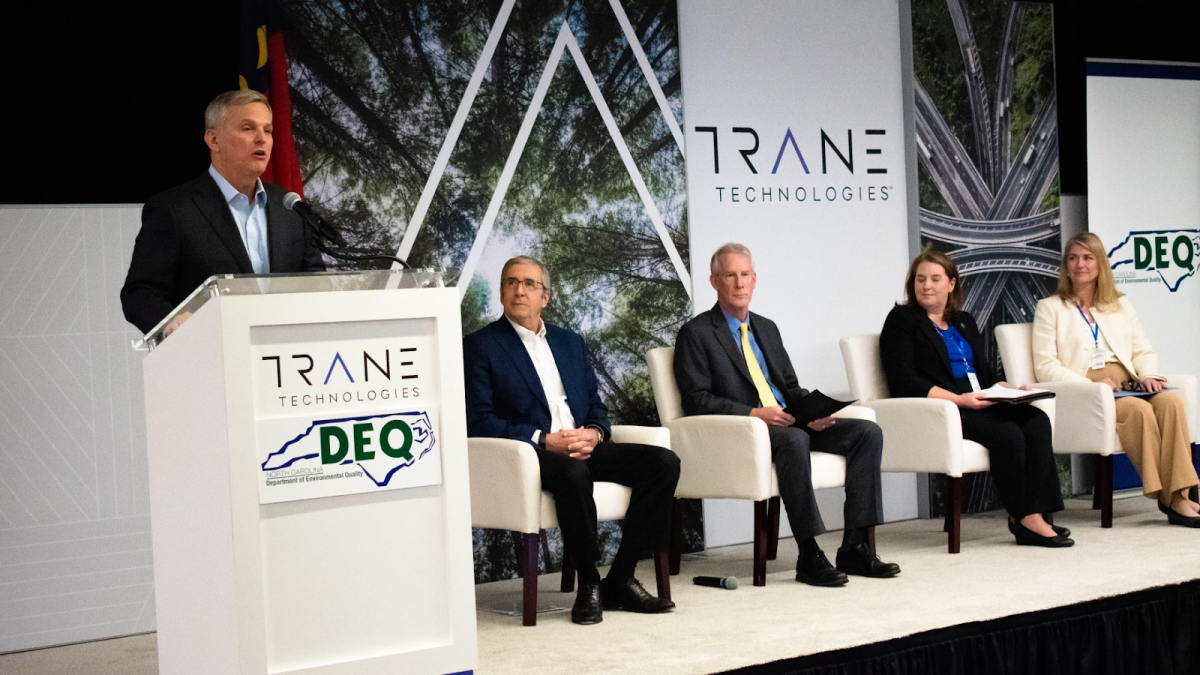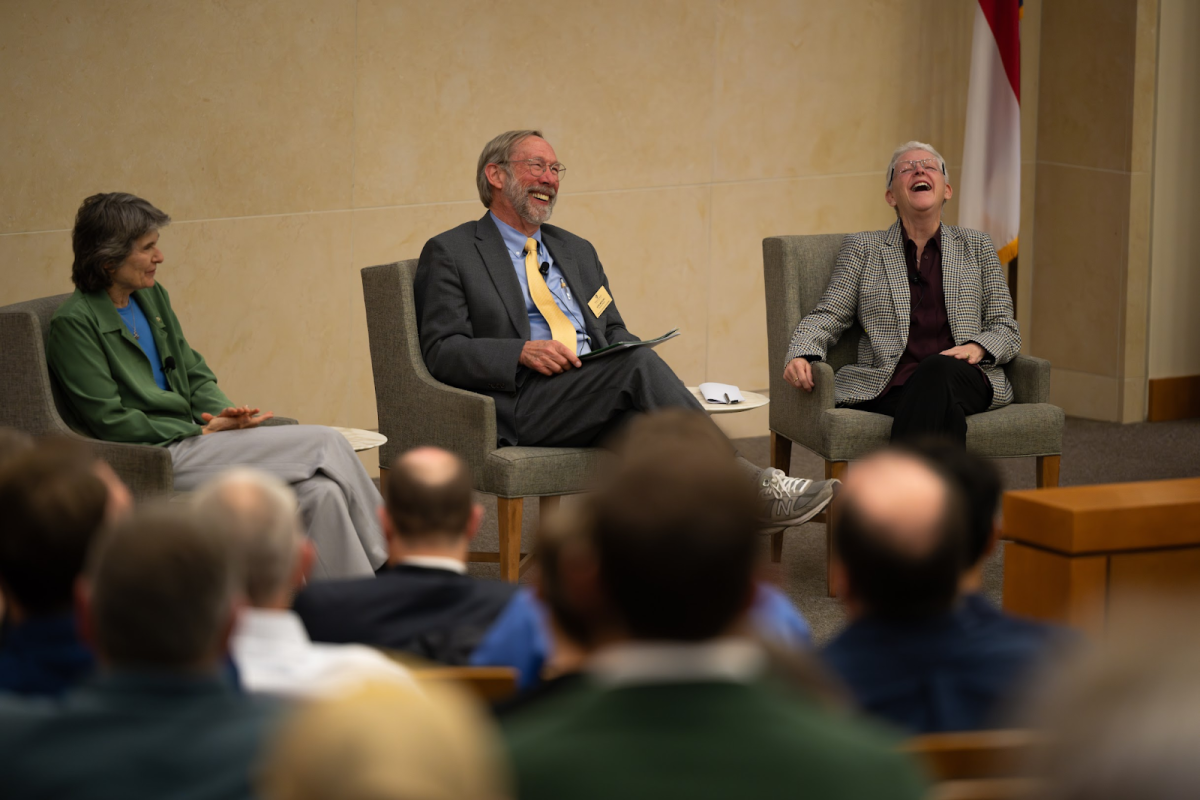
The time to vote for the 2024 presidential, state and local elections has arrived. With this it’s important to understand where current political candidates stand on pressing environmental issues and what they plan to do regarding climate action.
Depending on your background knowledge of climate topics, you may not know where to begin your research. Dr. Julie Velásquez Runk, director of the Wake Forest Environmental Program, professor of environment and sustainability studies and Weigl Fellow of Environment and Sustainability Studies helped break down where to look for each candidate’s climate agenda and proposed climate policies to help you make informed choices when voting.
Olivia Delgado is a junior and president of dEaCOfriendly, a student-driven organization promoting sustainable culture and action. Delgado also gave insight on how she stays up to date with climate news, and specifically how it impacts this election.
What’s the best way to find out where political candidates, on the local and national level, stand on environmental issues?
The Sierra Club, a historic grassroots environmental organization released their 2024 election endorsements to showcase which candidates are endorsed by various environmental groups.
How it works is that staff members evaluate the environmental and public health records of candidates and their experience of advocating for pressing climate issues. Dr. Velásquez Runk recommends this source to see which candidates are endorsed by the Sierra Club on the national level.
“To view North Carolina’s specific endorsements you can search for [North Carolina] and enter your address,” Dr. Velásquez Runk said.
Delgado recommends the NC League of Conservation Voters’ (NCLCV) legislative scorecard as a source to stay updated on local candidates’ environmental policies. Each year, the NCLCV releases a scorecard — the primary tool for tracking the environmental voting scores of North Carolina state legislators.
The goal of the scorecard is to hold elected officials accountable by examining how they’ve voted on issues that affect air, water and land — essentially verifying their claims of action.
For staying up to date more generally, Delgado recommends listening to “Spotify’s ‘NPR Summaries’ to receive quick but thorough updates on presidential debates, for example, in case you missed important climate news in real-time.”
What are important questions to ask when researching candidates’ climate agenda?
According to Dr. Velásquez Runk, some potential questions to research are: “whether and how candidates support alternative energy, whether they take big oil and gas money, how they address carbon taxes, whether and how they address climate justice, whether they address consumption and how they voted on the Inflation Reduction Act.”
Additionally, she recommends researching candidates’ natural disaster response — particularly in light of Hurricane Helene’s devastating aftermath — and whether they properly “addressed the relationship between climate change and hurricane intensity.”
Delgado advises spending less time on the candidate’s specific campaign websites because it comes across as an advertisement and instead recommends looking at what they’ve done in the past.
“When applying for a job, you don’t get hired just for what you will do for the company. Employers look at your resume and track record. What have you shown you can do and accomplish in the past?” Delgado said.
She believes we should implement this approach when researching local and presidential candidates.
What implications will this election have for the environment, climate change and clean energy?
Dr. Velásquez Runk emphasized that we are in the midst of a period of profound human-caused changes to the environment.
“This election will have many implications for the environment, climate change and clean energy,” Dr. Velásquez Runk said. “Our politicians need to take action to foster positive environmental action, strengthen environmental justice and invest in climate resilience and mitigate change.”
Staying informed on candidates’ past climate policy, proposed policy and personal views allows you to truly engage in the democratic process and hold politicians accountable for environmental and climate action.
Overall importance of staying informed on environmental policy
When asked for any last thoughts, Delgado expressed that she felt the biggest problem with environmental issues today wasn’t the lack of awareness on environmental issues, but rather the lack of implementation and action in the government due to many policy barriers.
To Delgado, the only way to combat this is by electing people who prioritize implementation in their agenda.
“The future of our economy, businesses and land use all have an environmental component,” Delgado said. “The way our system works is that if you want to see change, you need someone on the inside who prioritizes climate action in their agenda.”
Delgado continued: “Environmentalism isn’t just about science, it plays into our economy, social justice initiatives and more. It’s important not just for environmental change, but all change.”











Margaret Lillard • Oct 24, 2024 at 4:02 pm
Small correction: Sierra Club staff do not make our endorsements. They are made by Sierra Club members who volunteer for and are elected by the membership to leadership positions at regional, state and national levels. In North Carolina, the NC Chapter’s Political Committee votes on endorsements that are recommended by volunteers with our local Groups, which represent members across a number of counties.
Margaret Lillard • Oct 24, 2024 at 3:58 pm
If you’d like to see the endorsements in North Carolina made by the Sierra Club’s North Carolina Chapter, they’re at sc.org/ncendorsements. We are required by election law to present our federal and in-state endorsements separately. Thank you for the coverage!